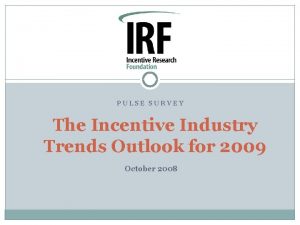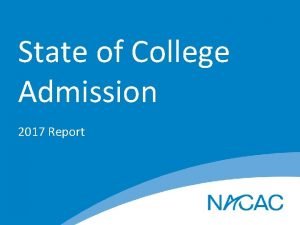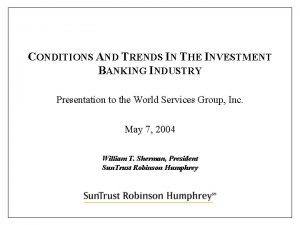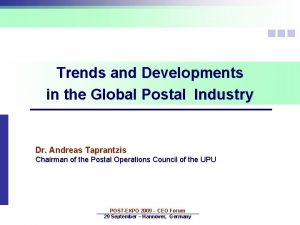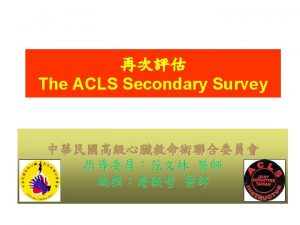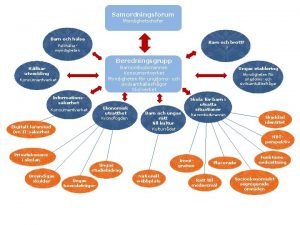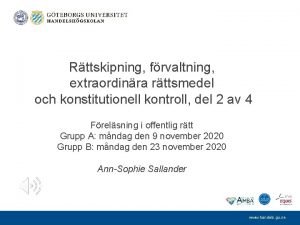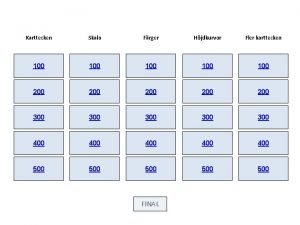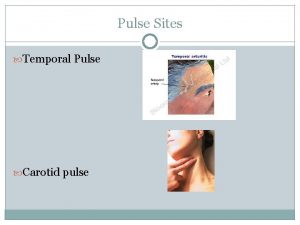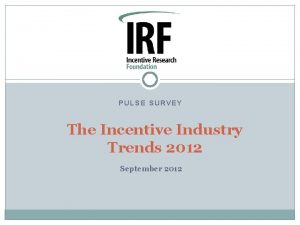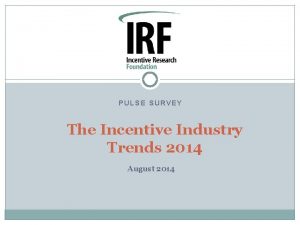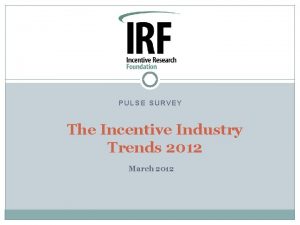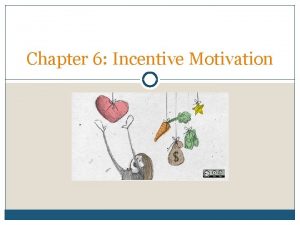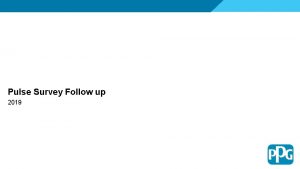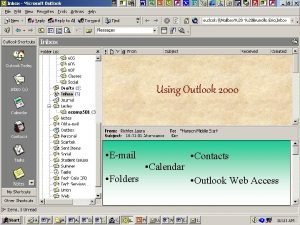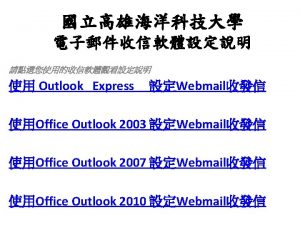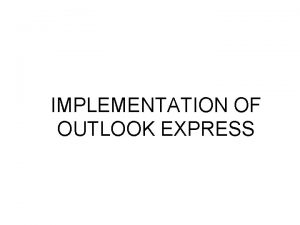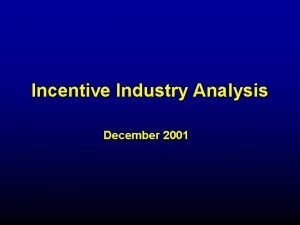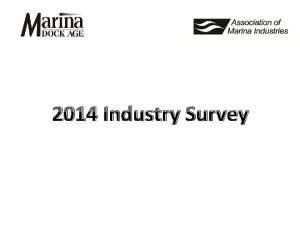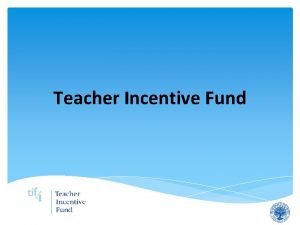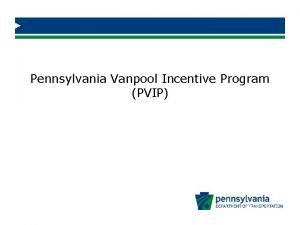PULSE SURVEY The Incentive Industry Trends Outlook for
























- Slides: 24

PULSE SURVEY The Incentive Industry Trends Outlook for 2009 October 2008

Background and Survey Purpose 2 In August 2008 it was decided that an appropriate topic for the final 2008 Pulse Survey would be an incentive industry trends outlook for 2009. Given that the Incentive Research Foundation (IRF) is charged with advancing the science of incentives, it surveyed industry professionals to obtain their opinions about the more salient trends affecting the industry during 2009. To this end, the IRF asked these professionals questions on trends with regard to incentive travel programs, merchandise non-cash programs, and budget changes forecast for 2009. In addition to the current topic on industry trends, the IRF tracks core issues of continuing interest to the industry: • The extent to which company financial forecasts influence incentive programs; • The effect of competitor reactions on company incentive programs; and • Sensitivity to others’ perceptions of company incentive programs.

Research Methods 3 Invitations to participate in this online survey were sent to 618 incentive providers, suppliers to the industry and corporate incentive travel buyers. The 79 survey participants can be categorized as follows… • • • Incentive travel provider (62%) Corporate incentive travel buyer (20%) Supplier, e. g. , hotelier (11%) Other (6%) …and represents, after undeliverable emails and out of office adjustments are made, a response rate of 14. 7% Data collection was conducted September 15 through October 10, 2008.

Highlights 4 Respondents overwhelmingly agree (78%) that the economy will have a negative impact on incentive travel programs, and that these programs’ budget will suffer decreases in 2009. With regard to travel incentive programs… • To enhance the air transportation component, included in programs will be… • All costs for air transportation, and • Round trip air transfers. • There will be a shift from international to domestic destinations. • There will be a reduction in the number of days/nights, the number of rooms and a decrease in on-site inclusions per participant. • Involvement of procurement and purchasing will increase in 2009.

Highlights (Continued) 5 Nearly half (49%) the respondents believe that the economy in 2009 will have a negative impact on the ability to plan and implement merchandise non-cash incentive programs. Most (53%) anticipate a decrease in budgets for these programs as well. With regard to merchandise non-cash incentive programs in 2009… • A plurality believe there will be no change in award selections, although some foresee included individual travel as an option. • The involvement of procurement and purchasing in planning for merchandise non-cash incentive programs will increase in 2009.

Highlights (Continued) 6 Respondents agree that there will be budget cuts in incentive program elements, particularly in… The two incentive program elements which many anticipate budgets remaining the same are… • • Incentive program on-site gifts. Number of total qualifiers. Awards budget. Incentive program non-meal components. • Incentive company management fees. • Incentive company involvement.

Highlights: Core Issues 7 Respondents in October 2008 are more likely than they were in September 2008 to agree with all three core issues… • The company financial forecast influences the design and implementation of incentive programs. . • Agree Sept 2008: 84% • Agree Oct 2008: 86% • Competitors’ reactions to programs impact the products and services included in company incentive programs. . . • Agree Sept 2008: 47% • Agree Oct 2008: 64% • Sensitive to perceptions of program extravagance to the extent that it would impact the type of company program awards and inclusions… • Agree Sept 2008: 45% • Agree Oct 2008: 75%

Current Topic Industry Trends for 2009 8 Incentive Travel Programs Merchandise Non-Cash Programs ROI – Budget Considerations

Perceived Impact of the Economy on Ability to Plan and Implement Incentive Travel Programs 9 Respondents overwhelmingly— about eight of ten—consider the economy as having a negative impact on their ability to plan and implement incentive travel programs. • Negative impact 78% • No impact 14% • Positive impact 8% In your opinion in 2009, what impact will the economy have on your ability to plan and implement travel incentive programs? (Base=79)

Techniques To Be Used to Enhance Air Transportation Component of Incentive Travel Program 10 The three most frequently mentioned techniques that will be used to enhance the air transportation component were: • All costs for air transportationrelated expenses are included 58% • Roundtrip airport transfers included 47% • Only tickets provided 44% With regard to the air transportation portion of incentive travel programs, what techniques will be used in 2009 to enhance this component? (Base=79; percentages may sum to more than 100% due to multiple responses allowed)

Destination Changes To Incentive Travel Programs 11 Nearly six of ten respondents anticipate in 2009 changes from international to domestic destinations, with about one in three anticipating no change in destinations. • Change from international to domestic locations 56% • No change in incentive travel destinations 37% In 2009, do you anticipate any of the following changes will be made with regard to incentive travel program destinations? (Base=79; percentages may sum to more than 100% due to multiple responses allowed)

Accommodation Changes To Incentive Travel Programs 12 While about one in three foresee no changes in accommodations will be made to travel incentive programs, others anticipate the following changes in accommodations: • Total number of days/nights reduced 49% • Number of rooms reduced 43% • On-site inclusions per participant decreased 39% With regard to accommodations for incentive travel programs in 2009, what changes, if any, will be made? (Base=79; percentages may sum to more than 100% due to multiple responses allowed)

Anticipated Changes to Sponsored Non-Meal Related Components of Incentive Travel Programs 13 While a plurality of respondents foresees no change in non-meal related components, an equal number anticipates—at various levels—a reduction in these components in 2009. • Reduced non-meal related components 43% • No change 43% • Increased 14% With regard to the sponsored (paid by your company) nonmeal related components for incentive travel programs what changes in 2009, if any, will be made? (Base=79)

Anticipated Changes in 2009 in the Involvement of Procurement and Purchasing in Planning and Implementing Incentive Travel Programs 14 A solid majority of respondents believes that procurement and purchasing will be more involved in planning and implementing incentive travel programs in 2009. • Involvement will increase 58% • Remain unchanged 35% • Involvement will decrease 7% With regard to planning and implementing incentive travel programs, do you anticipate the involvement of procurement and purchasing in 2009 to… (Base=79)

Anticipated Changes in 2009 Budgets for Incentive Travel Programs 15 A solid majority of respondents believes that 2009 budgets for incentive travel programs will decrease. • Budgets will decrease 58% • Remain unchanged 27% • Budgets will increase 15% In 2009, do you anticipate that budgets for incentive travel programs in general to… (Base=79)

Perceived Impact of the Economy on Ability to Plan and Implement Merchandise Non-Cash Incentive Programs 16 Nearly half the respondents anticipate the economy will have a negative impact on the ability to plan and implement merchandise non-cash incentive programs. Only one in four sees a positive impact for 2009. • Negative impact 49% • No impact 25% • Positive impact 26% In your opinion in 2009, what impact will the economy have on the ability to plan and implement a merchandise non-cash incentive programs? (Base=79)

Anticipated Changes in 2009 to Award Selections For Merchandise Non-Cash Incentive Programs 17 While a plurality of respondents foresees no change in award selection, of those who do anticipate change, the most frequently mentioned changes were… • Included individual travel as an option 30% • Increased use of debit/gift cards 24% • Decrease merchandise award value 18% With regard to merchandise non-cash incentive programs, what changes, if any, will be made in 2009 with award selections? (Base=79; percentages may sum to more than 100% due to multiple responses allowed)

Anticipated Changes in 2009 in the Involvement of Procurement and Purchasing in Planning and Implementing Merchandise Non-Cash Incentive Programs 18 A plurality of respondents believes that procurement and purchasing will be more involved in planning and implementing merchandise non-cash incentive programs in 2009. • Involvement will increase 46% • Remain unchanged 39% • Involvement will decrease 15% With regard to planning and implementing merchandise noncash incentive programs, do you anticipate the involvement of procurement and purchasing in 2009 to… (Base=79)

Anticipated Changes in 2009 Budgets for Merchandise Non-Cash Incentive Programs 19 A slight majority of respondents believes that 2009 budgets for merchandise non-cash incentive programs will decrease, while only one in ten believe budgets will increase. • Budgets will decrease 53% • Remain unchanged 37% • Budgets will increase 10% In 2009, do you anticipate that budgets for merchandise noncash incentive programs in general to… (Base=79)

Specific Program Budget Changes Anticipated in 2009 20 While all incentive program elements measured are anticipated to suffer budget cuts… • Incentive program on-site gifts are most impacted (68% foresee a budget cut); and • Incentive company involvement will be least impacted (57% anticipate budgets for this item remaining unchanged). In 2009, do you anticipate budgets for the following incentive program element[s] to increase, decrease or remain the same? (Base=79)

Core Issues Of Continuing Interest to the Industry 21 Influence of Company Financial Forecast Competitor Reactions Sensitivity to Perceptions About Incentive Programs

Influence of Financial Forecast on Design and Implementation of Incentive Program 22 Respondents in October continue to agree that their company’s financial forecast influences the design and implementation of incentive programs. October results… • Agree, influences 86% • Neither agree nor disagree 5% • Disagree, does not influence 0% However, in October there is a little more uncertainty than in September about the influence of forecasts on incentive programs (nearly one in ten reports “don’t know” as opposed to no uncertainty in September). How much do you agree or disagree that “My company’s financial forecast influences the design and implementation of incentive program”? (September Base=80; October Base-79)

Impact of Competitor Reactions to Products and Services Included in Company Incentive Programs 23 Respondents in October are more likely than in September to agree that competitor reactions impact the products and services included in their company incentive programs. • Agree, competitor reactions have an impact 64% • Neither agree nor disagree 22% • Disagree, does not impact 0% How much do you agree or disagree that “Reactions to our incentive program by our competitors directly impact the products/services that are included in our incentive program and the point values assigned to each product/service”? (September Base=80; October Base=79)

Sensitivity to Non-Incentive Audience Perceptions of Program “Extravagance” 24 Respondents are significantly more likely in October, than in September to agree that their company is sensitive to perceptions of program extravagance to the extent that the type of awards and program inclusions are changed. October data… • Agree, perceptions of program extravagance causes changes in awards/program inclusions 75% • Neither agree nor disagree 15% • Disagree, does not impact 0% How much do you agree or disagree that “The visibility by both internal and external non-incentive audiences prevent us from offering awards that are considered extravagant and as such we have significantly changed the type of awards and program inclusions for our incentive program”? (September Base=80; October Base=79)
 Outlook incentive outlook
Outlook incentive outlook Diversity and inclusion pulse survey
Diversity and inclusion pulse survey Deloitte global aerospace and defense industry outlook
Deloitte global aerospace and defense industry outlook Nacac admission trends survey
Nacac admission trends survey Investment banking trends
Investment banking trends Postal industry trends
Postal industry trends Ample abcde
Ample abcde En lathund för arbete med kontinuitetshantering
En lathund för arbete med kontinuitetshantering Mat för idrottare
Mat för idrottare Publik sektor
Publik sektor Datorkunskap för nybörjare
Datorkunskap för nybörjare Meios steg för steg
Meios steg för steg Fredsgudinna
Fredsgudinna Myndigheten för delaktighet
Myndigheten för delaktighet Rita perspektiv
Rita perspektiv Ministerstyre för och nackdelar
Ministerstyre för och nackdelar Tack för att ni lyssnade
Tack för att ni lyssnade Bat mitza
Bat mitza Tack för att ni lyssnade bild
Tack för att ni lyssnade bild Claes martinsson
Claes martinsson Nyckelkompetenser för livslångt lärande
Nyckelkompetenser för livslångt lärande Sju för caesar
Sju för caesar Karttecken ruin
Karttecken ruin Datumr
Datumr Rbk mätning
Rbk mätning
